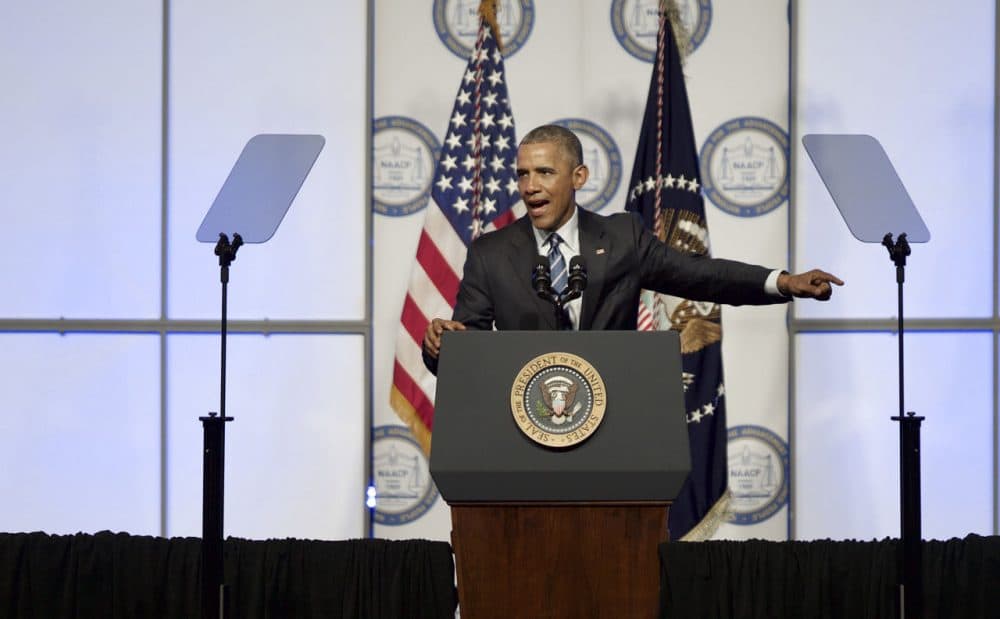Advertisement
Obama Calls For Criminal Justice Reforms
Resume
In a speech Tuesday, President Obama called for fixing what he called the "broken system" of criminal justice, which he said sends too many non-violent drug offenders to prison for too long because of Reagan-era mandatory minimum sentencing.
On Monday, Obama commuted the sentences of 46 non-violent drug offenders. In a personal letter to each soon-to-be ex-prisoner, Obama warned them, "it will not be easy" for them once they get out. Thursday, he will become the first sitting U.S. president to visit a federal prison.
Will there be meaningful changes to the U.S. criminal justice system? Andrew Cohen, a commentary editor at The Marshall Project, discusses this with Here & Now's Meghna Chakrabarti.
Interview Highlights: Andrew Cohen
On the president's upcoming visit to a federal prison
"It's literally historic. No president has ever done it. A lot of presidents of course have talked about law and order with varying degrees of ardor, but President Obama actually is going to go to this medium security facility. He's apparently going to meet with correction officials and inmates there — low-level, non-violent drug offenders. And it's all of part of this symbolic push by the White House to try to keep up with Congress as Congress deliberates and discusses various sentencing reform packages that really would reshape the landscape on federal crime and punishment."
"The change has come because conservatives over the past say three or four or five years have come to realize they don't want to pay any more for the huge cost of mass incarceration."
On which party has been leading the prison reform effort
"The change has come from conservatives. The change has come because conservatives over the past say three or four or five years have come to realize they don't want to pay any more for the huge cost of mass incarceration on the state level or even on the federal level. Pat Robertson years ago was talking about how crazy it is that California has spent more money on prisons than on schools. So all of these voices have sort of coalesced together to give political cover to liberals and progressives to say, 'You know what, we may disagree exactly on the reasons why we want these reforms, but we agree that the reforms should take place.'"
"Now, the big question going forward as we stand here today is — it's one thing for everyone to talk about it, and everyone's come together and agrees that there are these broad changes that need to be made; it's another thing for these changes actually to be made. And that's the open question. Congress has all these measures before it, but still hasn't voted substantively on anything in years."
How much will a federal reform actually help?
"Of course, there are tens of millions of people who are affected by those who are incarcerated. But crunching the numbers like that brings up a good point. What we're talking about here from the president is federal reform that's going to focus on this relatively small number of people. The greater number of people — the 2 million people who are in state and local prisons and jails — they've already started to see some reform. And I think one of the fascinating components of this story is the federal government is not leading. The federal government is definitely following the states that have gone and reformed their criminal justice systems. Texas has done it, Alabama has done it, Mississippi and Georgia — red states."
On the significance of Obama's speech
"I don't think this president would have delivered this speech he did this week a year ago or two years ago or five years ago, no way. Because it is a striking speech, and I think cuts into one of the essential issues that he has mostly downplayed, which is his race and the racial components of criminal justice. But you notice in the speeches since Ferguson a year ago, this increasing volume from the president and even from his attorney general on the point. So either he's lucky, or he was really, really smart and he waited for the right time. Either way, he's now in the midst of this push that we're waiting to see how it all plays out."
Guest
- Andrew Cohen, commentary editor at The Marshall Project, an online journalism organization focusing on criminal justice issues. He tweets at @JustADCohen.
This segment aired on July 15, 2015.